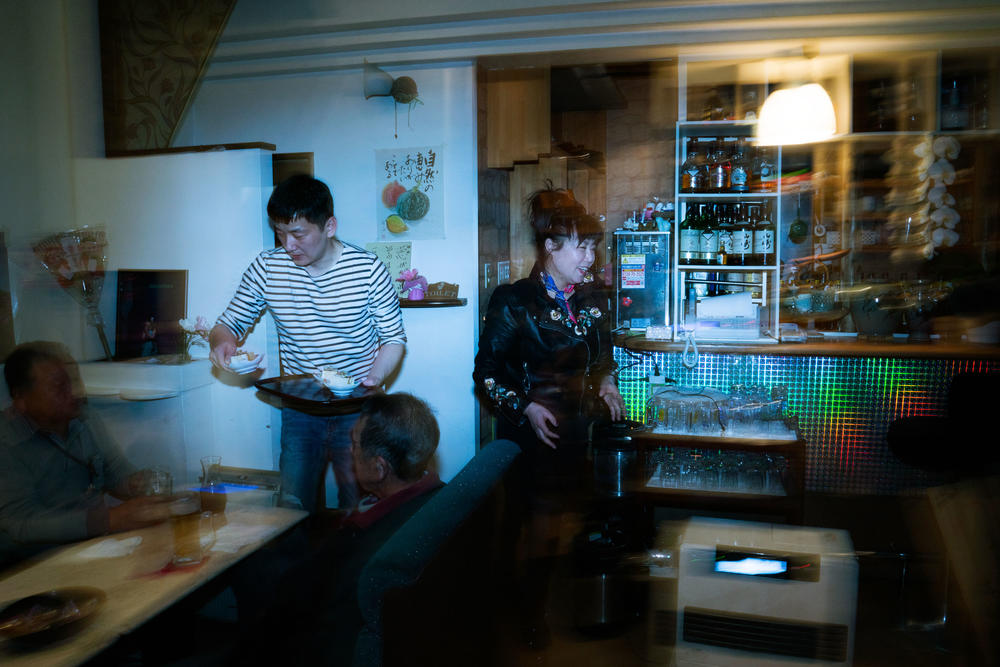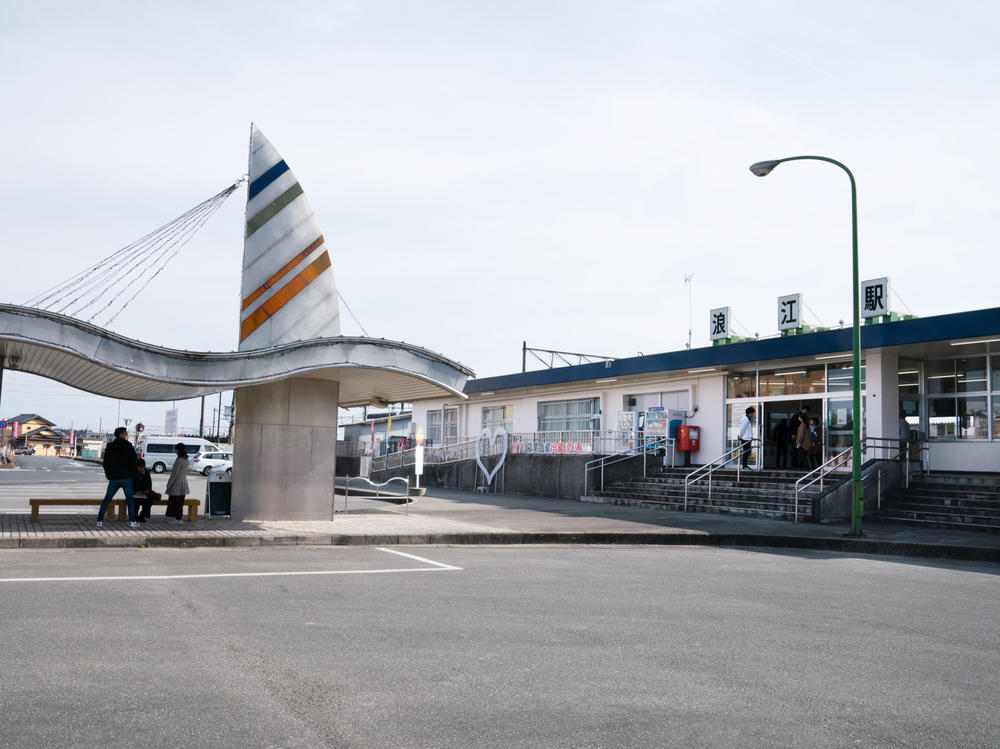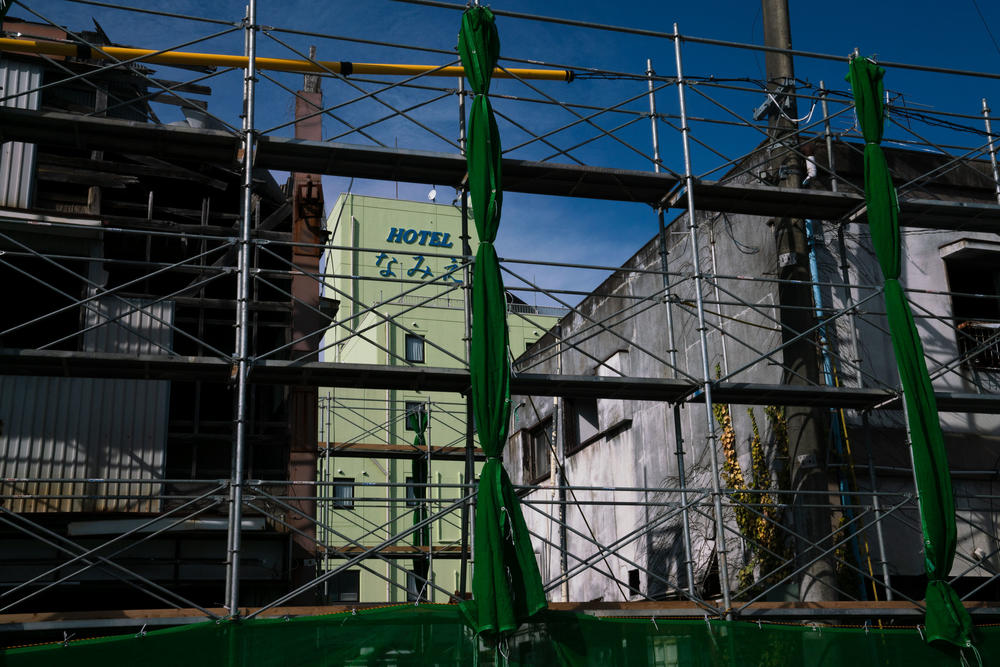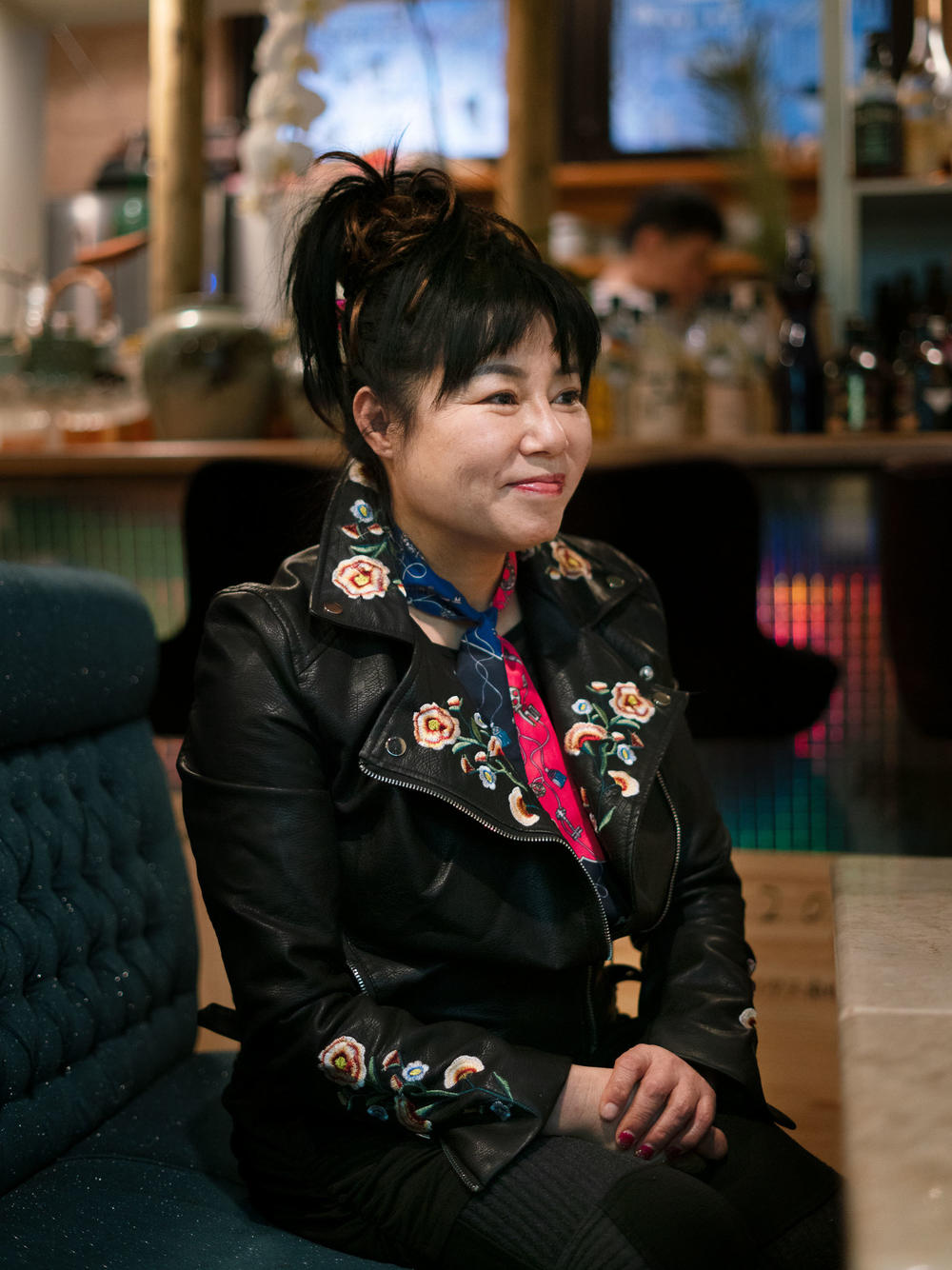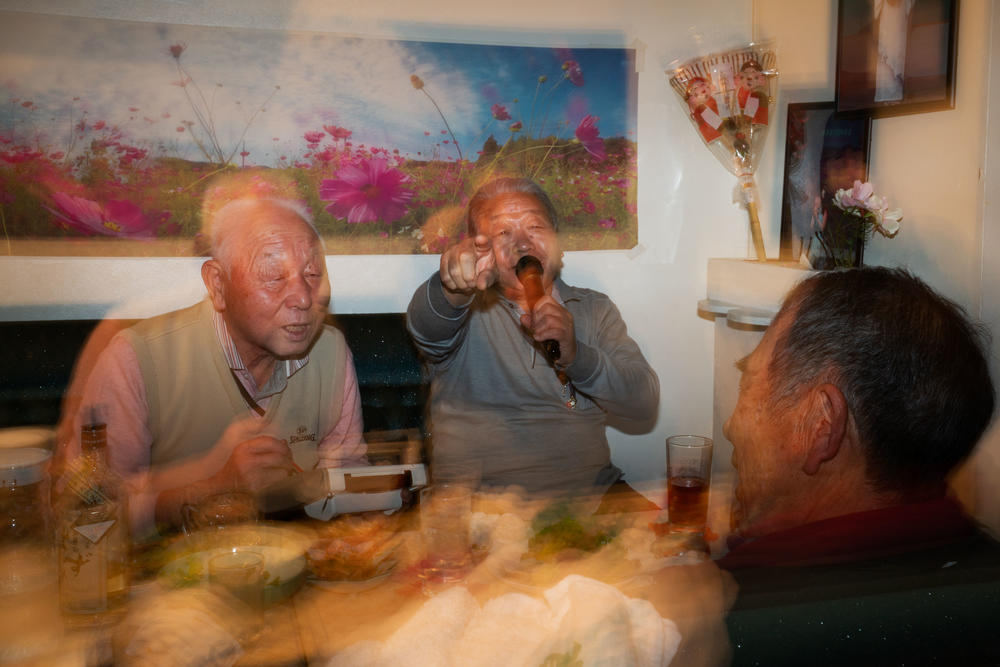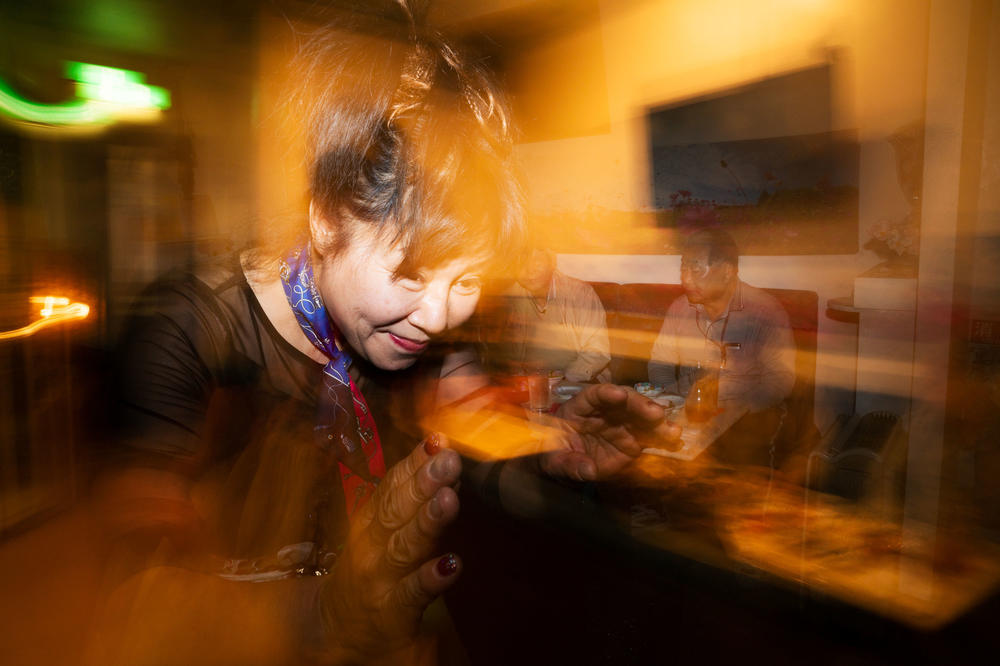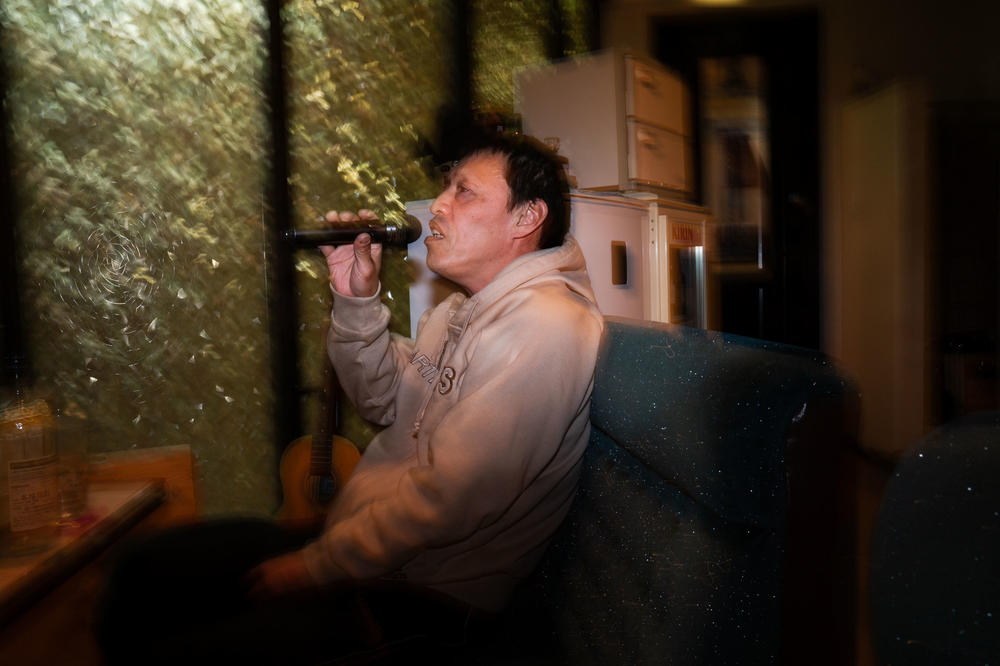Section Branding
Header Content
A Karaoke Bar Is Helping A Japanese Town Come Back To Life After Fukushima Disaster
Primary Content
In downtown Namie, a small coastal city in eastern Fukushima prefecture, there was a chorus of construction noise this spring. Truck after truck rolled through, bringing workers to string up power lines and rip down deserted houses, rebuild structures and repave roads.
But at night, all was quiet — except in one small corner of a tiny strip mall. The faint sounds of music, laughter and maybe a hit of tambourine floated on the wind, traveling down empty sidewalks and deserted streets, leading to a karaoke bar in full swing.
Namie was once home to over 21,000 people, a close-knit community of farmers and fishermen, dotted with rice paddies and pastures and a bustling downtown full of shops, schools and restaurants.
But on March 11, 2011, an earthquake and tsunami triggered explosions at three reactors at the nearby Fukushima Daiichi Nuclear Power Plant, just 5 miles away. The earthquake rocked the city, while the tsunami devastated the coastal area, washing people and buildings out to sea. Those who survived were forced to evacuate, to escape the plumes of radioactive material carried by the wind after the nuclear explosions.
Nearly overnight, Namie became a ghost town — completely sealed off from the public for six years.
Slowly though, as radiation levels have decreased, places like downtown Namie have reopened and are starting to come back to life — even if only a fraction of the population has returned. The Cosmos Karaoke Bar caters to that fraction, hoping to bring a sense of community back to a town that once thrived on it.
In March, two giant screens on either side of the room flashed Japanese lyrics while a dozen patrons, mostly men, passed around microphones, singing at the top of their lungs, shaking tambourines and clutching ceramic cups filled with sake and tall glass mugs of beer.
Things changed in April, when the government declared a national emergency because of the coronavirus pandemic. Cosmos Karaoke had to close under government orders, in an effort to stop the virus from spreading. The town, like the rest of Japan, ground mostly to a halt. But recently, the bar reopened, although business has been slower than before.
The force driving it is Minza Lee, a 63-year-old South Korean woman who has lived in Japan for decades. She opened Cosmos Karaoke in 2018. She's a ball of energy, laughing and smiling, greeting every customer by name and often singing along. In March, she wore a tight leather jacket embroidered with flowers and a big yellow skirt and a sparkly top as she wandered around the room, urging customers to eat more in a motherly sort of way.
After the Fukushima disaster, she came to Namie from Fukushima City as a volunteer, helping to clean up debris and abandoned buildings. She says she fell in love with the town, with the idea of bringing it back from disaster, helping to bring it to life again — even though many of her friends thought it was a bad idea.
"Everyone was against it," she remembered. "They said, 'You're going to live in a nuclear town? You're crazy!' But the more they pushed back, the more I said, 'Yes, I absolutely will.' "
So she moved to Namie for good and opened this bar named after the town flower — one of the most popular blooms in Japan, known as the fall cherry blossom. She hung big, long posters on the walls showing pink and purple cosmos flowers, which appear to be dancing to the near-constant music. The room is filled with glittery blue velvet booths topped with big floral pillows. The ceiling is painted like a bright blue sky with fluffy white clouds.
"When I first came here, it was so depressing. Everything was rotting and falling apart," Lee said in March. "So I decided that I had to bring the light, the brightness, the energy."
She pointed to the glitter, the decorations, the ceilings — as if wanting to show evidence that she accomplished what she had set out to do.
In the kitchen in the back, a small staff prepared mostly Korean food, with no set menu — plates of kimchi and rice cakes started flowing as soon as customers sat down. It's one of the few places to get food in town.
Since 2017, Namie has seen progress and new businesses have sprung up. There are several ramen shops open for lunch and a few new hotels. The main train line was recently rebuilt to connect with major cities like Sendai, about 60 miles to the north, and Tokyo, about 150 miles south.
But there isn't much entertainment for the 1,000 or so people who have come back to live here, many of whom are elderly.
That's why Cosmos opens in the late afternoon — for them.
In one corner booth in March, three friends in their 70s toasted one another over plates of seafood and scallion pancakes and grilled pork-belly lettuce wraps. The men used to be neighbors in Namie, but after the disaster, they scattered to different areas. Only one lives back in Namie now.
They try to meet up as often as they can and remember the lives they once had together in the town.
"We used to all meet up in our old neighborhood, but now, it's a total ghost town, totally empty... except for the animals that have taken over our homes," said Masato Yamazaki, 76, with a wry laugh.
He said he wished that Cosmos Karaoke had even more customers, that more people had come back to Namie. He pointed out that his friends were drinking iced oolong tea, since they had a long drive home.
"But it's nice to have this place, to meet and reminisce," he said.
And, of course, sing.
Yamazaki's favorite tunes are old Japanese love songs — which he sang often that March night, much to the delight of his friends, who clapped and cheered.
The construction workers who've been painstakingly rebuilding the town have also moved here, at least for now.
One of the workers, 53-year-old Takashi Togashi, sat alone in a booth next to a pile of tambourines. A guitar rested against the wall. He moved to Namie to empty out and tear down the rotting houses that have been sitting abandoned for nearly a decade. When he first arrived a few years ago, it was scary, he said, especially at night.
"There was no one on the streets — not a single person. All you could hear was dogs barking ... and even they sounded scared," he said.
It was lonely and depressing, especially given the work he had to do. "The houses are disgusting. Sometimes I'll open a refrigerator that hasn't been opened in nine years! Just try to imagine," he said, making a gagging noise.
But then he found Cosmos Karaoke and finally had a way to blow off some steam and decompress after the long days. When he comes here, he can just be happy, he said, laughing.
With that, Togashi picked up a microphone and put on ABBA's "Dancing Queen." As the opening piano riff blasted from the speakers, everyone clapped and cheered. Someone grabbed a tambourine. Another person took up an extra mic. A small karaoke band formed.
Lee said this is exactly why she committed to opening this bar — to bring people together.
"I know my contribution — a karaoke bar — is small," she said, looking around. "But it's important."
And as the chorus of "Dancing Queen" blasted over the speakers and the small crowd joined in, it was clear everyone else in the room agreed.
Kat Lonsdorf (@lilkat_bigworld) is NPR's Above the Fray fellow. The fellowship is sponsored by the John Alexander Project, which supports foreign reporting in undercovered parts of the world. Follow the fellowship on Instagram (@thejohnaproject) and Twitter (@thejohnaproject).
Copyright 2020 NPR. To see more, visit https://www.npr.org.
